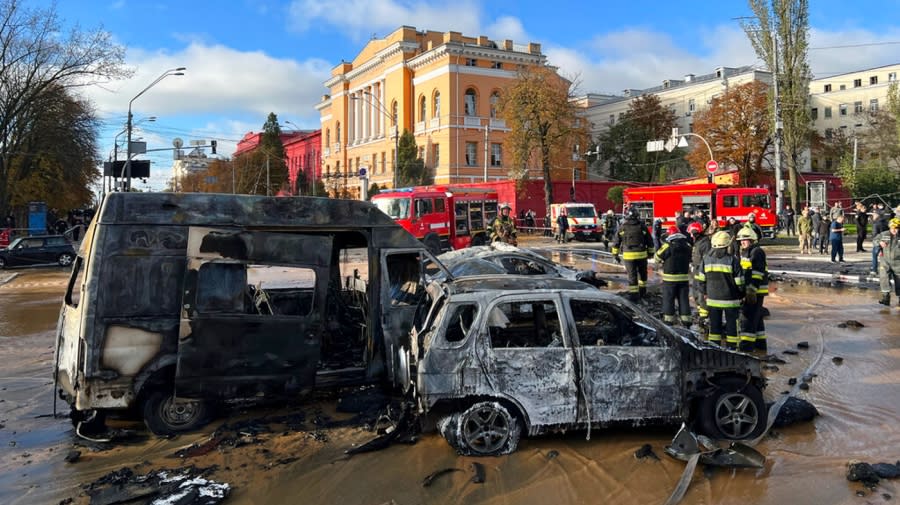
Russian President Vladimir Putin early Monday ordered his forces to launch dozens of missiles at Ukrainian cities, a deadly escalatory move that comes as Moscow increasingly accuses Ukrainians of terrorism and warns of its own potential future response.
We’ll share what we know about the strikes, the international response and Ukraine’s renewed plea for more lethal aid.
This is Defense & National Security, your nightly guide to the latest developments at the Pentagon, on Capitol Hill and beyond. For The Hill, I’m Ellen Mitchell. Did a friend forward this newsletter to you? Subscribe here.
Pressure rises to help Ukraine with air defenses
The pressure for the United States to send Ukraine more advanced air defense systems reached a new high Monday after Russia escalated its war on the country with a barrage of deadly missile strikes.
The Kremlin attacks, which targeted civilian areas that for months had enjoyed a relative calm, has produced anew the argument that the West send Ukraine more high-tech air defense weapons, including those similar to Israel’s Iron Dome missile interception system.
Why the wait? Washington has long resisted providing Kyiv with such lethal aid, fearing it could escalate the conflict and arguing it would be too complicated to train Ukrainian troops on the advanced systems. But the latest Russia atrocities could shift the wind in Ukraine’s favor, experts say.
“Ukrainians have shown over and over again, if you give them the right tools to defend themselves, they will. Hopefully this moves the needle,” said John Spencer, a retired Army major and the chair of Urban Warfare Studies at the research organization Madison Policy Forum.
Devastating strikes: Russian President Vladimir Putin on Monday ordered a rain of cruise and ballistic missiles on Kyiv and nine other Ukrainian cities, killing at least 11 individuals and injuring at least another 64.
Putin said the attacks were a “harsh” response to a Saturday explosion on the Kerch Strait Bridge, a crucial Russian rail and road line to the occupied Crimean peninsula. The bridge is viewed as a key supply route for Moscow’s military offensive on the south of Ukraine.
The strikes also follow embarrassing Kremlin losses in its so-called “special military operation,” with Russian troops pushed from thousands of miles of territory in a lightning counteroffensive by Ukrainian armed forces starting in September.
Condemnation and renewed calls: Russia’s escalation has prompted international condemnation and Ukrainian President Volodymyr Zelensky took to Telegram to plead for more air and missile defenses from the West and soon.
About 84 missiles were launched on Ukraine but its air defenses were able to down 43 of them, Kyiv’s forces said, pointing to successes with the Western-supplied military aid.
Zelensky later on Monday revealed he had a “productive” conversation with President Biden on the matter, stressing that air defense “is currently the number 1 priority in our defense cooperation,” he tweeted.
Also from The Hill:
Menendez: Freeze US-Saudi cooperation
Senate Foreign Relations Committee Chairman Bob Menendez (D-N.J.) on Monday urged the U.S. government to freeze its cooperation with Saudi Arabia due to that nation’s decision to cut oil production, which is likely to benefit the Russian economy as it wages its war against Ukraine.
“The United States must immediately freeze all aspects of our cooperation with Saudi Arabia, including any arms sales and security cooperation beyond what is absolutely necessary to defend U.S. personnel and interests,” Menendez wrote.
A ‘terrible decision’: He said that the “terrible” decision made by OPEC+, an organization made up of countries including Saudi Arabia, Russia, Iraq and Iran that export oil, would “help underwrite [Russian President Vladimir Putin’s war.”
“There simply is no room to play both sides of this conflict – either you support the rest of the free world in trying to stop a war criminal from violently wiping off an entire country off of the map, or you support him,” he wrote.
The senator pledged that he will not approve any cooperation with Saudi Arabia on the Foreign Relations Committee unless and until the nation’s leadership changes its decision.
Earlier: Saudi Arabia’s energy scale-back has been criticized by numerous Democrats since it was announced on Wednesday.
The 2 million-barrel-per-day cut will likely contribute to a spike in gas prices in the U.S., which may affect Democrats’ chances in the midterm elections next month.
Sen. Bernie Sanders (I-Vt.) advocated on Friday for pulling U.S. troops out of Saudi Arabia in response to the move.
ON TAP FOR TOMORROW
-
NATO Secretary-General Jens Stoltenberg will hold a news conference ahead of NATO Defense Ministerial
-
The Association of the U.S. Army will hold Day 2 of its annual meeting and exposition with speakers including Army Chief of Staff Gen. James McConville at 8 a.m. in Washington, D.C.
WHAT WE’RE READING
Well, that’s it for today! Check out The Hill’s defense and national security pages for latest coverage. See you tomorrow!
For the latest news, weather, sports, and streaming video, head to The Hill.




